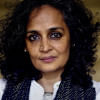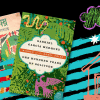Not a supporter of art made for propaganda

When Arundhati Roy finally entered the halls at Midas Centre yesterday evening, cheers erupted amidst the waiting audience, accompanied by sighs of relief -- “so, it's finally happening!” one said to the other.
But it was not without a lot of drama.
Originally, the event was to be held at the Krishibid Institute in Farmgate. But the Dhaka Metropolitan Police, in a sudden announcement, cancelled the permission due to “unavoidable circumstances" triggering outrage.
Even after the change of venue to Midas Centre, much was done by the government to stop the discussion, organisers said.
Despite the uncertainty, artists, writers, journalists, students and citizens alike crowded the centre to hear the author of “The God of Small Things” and “The Ministry of Utmost Happiness”.
Hundreds of Arundhati fans registered for the Chhobi Mela session titled “Utmost everything, Arundhati Roy in conversation with Shahidul Alam,” which began around 6:45pm and ended around 9:10pm.

The conversation between Arundhati and Shahidul, a Booker Prize Award winner and an award-winning photojournalist and social activist respectively, was about democracy, freedom of expression, human rights, nationalism, development, art, regional politics and the essays and books Arundhati has written over the last 20 years.
“Somehow, artists and writers have been led to believe that their place is in the marketplace, between best seller lists, literature festivals and film festivals,” Arundhati said, while talking about how it is always important for writers and artists to speak out and do the right thing.
She also spoke about the long history of writers, artists and poets facing obstacles from the authorities for speaking out the truth.
"Why are you here?" joked Shahidul Alam, to which Roy replied, "Because of you Shahidul, and also because of all of you!" pointing to the audience.
Arundhati Roy, whose father is from Barisal, was among the scores of scholars, writers, rights activists and Nobel laureates who demanded the release of Shahidul, also the founder of Chhobi Mela. He was hauled up from his home last year, hours after his interview with Al Jazeera which was critical of the government and jailed for about three months.
Shahidul is now on bail, and has recently challenged the legality of his arrest.
“I am not a big supporter of art made for propaganda, but at the same time, art that is not cognitive means nothing to me either,” she said.
Artists have been made less dangerous, often not by denying regime but by placing themselves in the marketplace and making themselves commercially viable, she added.
“That has been more seductive than any kind of ruthlessness or censorship.”
The audience included rights activists Khushi Kabir, Shireen Huq, founder of Gonoshasthaya Kendra Zafrullah Chowdhury, Prof Anu Muhammad and writer Anisul Hoque.
Besides discussing various issues, showing videos and sharing anecdotes, Arundhati read certain paragraphs from her novels and essays.
After a brief question and answer session, she read the first few lines from her latest fiction, The Ministry of Utmost Happiness, which came 20 years after her award-winning novel “The God of Small Things”.

 For all latest news, follow The Daily Star's Google News channel.
For all latest news, follow The Daily Star's Google News channel. 








Comments